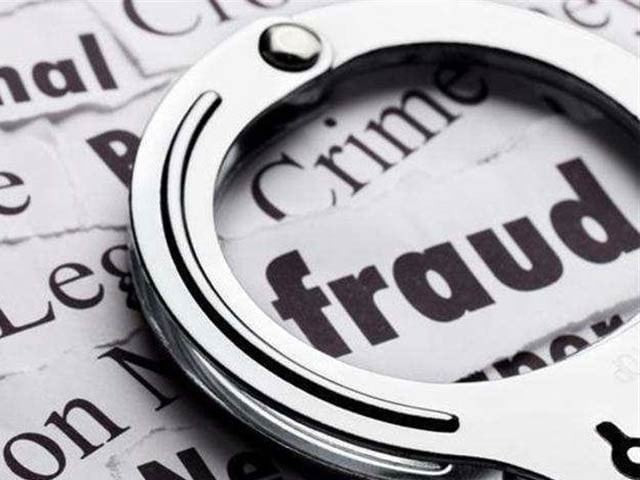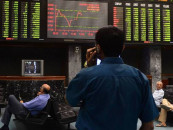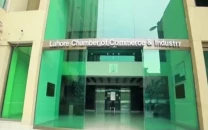Big firms commit Rs3.4tr tax fraud
Corporates fraudulently claim 25% input tax adjustment against 4-7% benchmark

Finance Minister Muhammad Aurangzeb disclosed on Thursday that Pakistan's large corporate firms and their white-collar management had been involved in a whopping annual sales tax fraud of Rs3.4 trillion – in a statement that brings into question the efficacy of the regulatory setup.
So far, the Federal Board of Revenue (FBR) has established Rs227 billion worth of fraud in five major sectors, Aurangzeb said while addressing a press conference at the FBR headquarters.
It had been found that there existed a tax gap of Rs3.4 trillion due to tax evasion and fraud, the finance minister said, adding that tax evasion could be gauged from the fact that only 14% of 300,000 manufacturers were registered with the FBR.
The tax fraud was unearthed after the appointment of Rashid Langrial as FBR chairman about two months ago. Those companies were evading sales tax by fraudulently claiming 25% of total sales in input tax adjustment against benchmark rates of 4% to 7%, said the finance minister.
The statement puts a major question mark over the effectiveness of Pakistan's regulatory regime and the credibility of four big external tax audit firms. Balance sheets of these companies are reviewed by the FBR, the Securities and Exchange Commission of Pakistan and verified by the audit firms.
The Rs3.4 trillion sales tax fraud is more than the total defence spending of Pakistan – both explicit and implicit. Out of the sales tax collection potential of Rs6.5 trillion, only Rs3.1 trillion was collected, Aurangzeb said, adding that the management of those companies was directly involved in the fraud and they were aided by their finance departments.
"My appeal to chief finance officers of corporate sector firms is that they should not sign the next sales tax return statements that are due for October 15 until these are honestly prepared," said FBR Chairman Rashid Langrial. Many of the registered entities were also involved in misreporting turnover, excess input tax claims and the use of fake and flying invoices, he added.
Sales tax is collected in value-added tax (VAT) mode as per best international practices. Under this mode, trust is reposed in business entities for tax collection from buyers.
Responding to a question on whether Pakistan should end the value added-based sales tax system and fix a flat 10% rate, the finance minister said that he would not comment on this.
The standard sales tax rate is 18% and in many cases it is 25%. However, FBR Member Inland Revenue Policy Hamid Atiq Sarwar disclosed that the effective sales tax rate was just 3%, indicating massive tax leakages and evasion.
About the involvement of big audit companies, the FBR chairman said that the prime minister had already approved the strengthening of audit oversight board.
The finance minister shared findings of a study pertaining to steel, cement, beverages, batteries and cement sectors. It has been found that malpractices prevail across the business sectors and a majority of the entities claim input tax in excess of the benchmarks and best industrial practices.
Aurangzeb said that 33 large businesses engaged in the iron and steel sector, representing more than 50% of the total reported sales, were found to have evaded sales tax by claiming excess input tax of Rs29 billion. The major source of fake and dubious input tax was the purchase of scrap metal and coal.
The benchmark input tax adjustment, as a percentage of total sales, was 7% but companies claimed up to 25%.
"It is nothing more than a lie and fraud by big steel companies," the FBR chairman said and pointed out that after the registration of cases, the benchmark threshold came down to 4%.
The finance minister revealed that 19 companies in the cement sector claimed excess input tax of Rs18 billion in fiscal year 2023-24. The major source of fake and dubious input tax was the purchase of coal.
For analysis, four big cement companies representing 54% of total sales were selected and they all were found involved in massive tax fraud, Aurganzeb elaborated.
He said that an analysis of six active cases across the battery sector, representing 99% of total sales, revealed that a major part of the sector claimed excess input tax of Rs11 billion. The major source of fake and dubious input tax was the purchase of lead.
The benchmark input tax adjustment for battery business was 8% but the companies claimed up to 15%.
Likewise, 16 active cases in the sector engaged in the production of aerated water, representing 99% of total sales, revealed that some of them claimed excess input tax of Rs15 billion in the last fiscal year. The major source of fake and dubious input tax was the purchase of sugar, plastics and services.
In the beverage sector, the benchmark tax adjustment rate was 7%, by Coca-Cola International, but other companies claimed up to 20%.
The textile sector is a major source of tax evasion. The finance minister said that segment-wise study of 228 active cases of spinning, weaving and composite units revealed that many of them claimed excess input tax of Rs169 billion.
The major source of fake and dubious input tax was the purchase of services, chemicals, coal, packaging and other irrelevant materials.
"These businesses are thriving on the basis of fraudulent business practices, which we cannot allow any more," Langrial said.
"Input tax adjustment system is the biggest fraud," he said but ruled out the enforcement of a single-stage sales tax system to end fraud.
The finance minister said that the FBR had so far identified and gathered evidence of tax fraud in different sectors, which included 11 cases in the battery sector, 897 cases in the iron and steel sector and 253 beneficiaries of fake input tax claims on coal purchase.
He emphasised that sales tax fraud was a criminal offence and carried strict action under the law including arrest and imprisonment up to 10 years other than heavy penalties and fines.
Action will be taken against owners of business, in cases of sole proprietorship, partners in cases of firms and directors, CEOs, CFOs and other authorised persons, according to the FBR.


















COMMENTS
Comments are moderated and generally will be posted if they are on-topic and not abusive.
For more information, please see our Comments FAQ